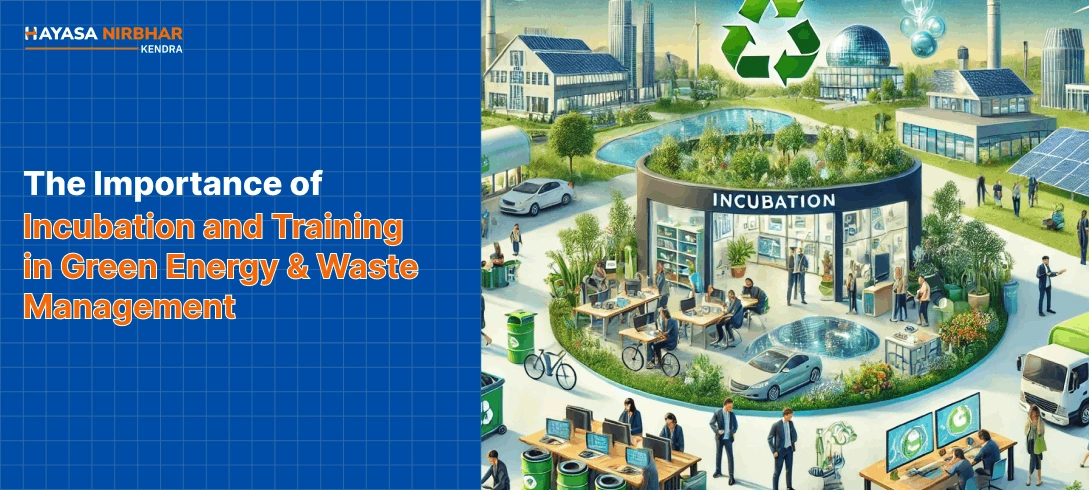
The Importance of Incubation and Training in Green Energy & Waste Management
As the world shifts towards more sustainable practices, green energy and waste management are two key areas of focus. The transition to a cleaner, more sustainable future requires innovation, education, and the development of new technologies. One of the most effective ways to drive this transformation is through incubation and training programs that support entrepreneurs, businesses, and individuals in these sectors. By fostering talent, nurturing new ideas, and providing essential skills, incubation and training are vital for the successful scaling of green energy and waste management solutions.
1. Fostering Innovation in Green Energy & Waste Management
Incubation centers play a crucial role in encouraging innovation by providing a structured environment for new ideas and technologies to grow. These centers provide startups with the resources they need, including funding, mentorship, and access to industry networks.
- Supporting Startups: Incubators provide a platform for young companies in the green energy and waste management sectors, helping them to refine their products, test new technologies, and attract investors.
- R&D and Technology Development: Innovation hubs often focus on cutting-edge research and development, enabling entrepreneurs to create sustainable solutions that address energy efficiency, waste reduction, and the circular economy.
- Networking Opportunities: These centers connect entrepreneurs with industry experts, suppliers, and potential clients, facilitating the exchange of ideas and promoting cross-collaboration.
2. Enhancing Skills Through Training
Training programs are essential in equipping individuals with the necessary skills to thrive in the green energy and waste management sectors. As these industries grow, the demand for trained professionals who understand the latest technologies and practices increases.
- Industry-Specific Skills: Training programs tailored to green energy and waste management ensure that workers are equipped with the knowledge and hands-on skills needed to operate in these industries. This includes knowledge of renewable energy technologies, waste segregation, recycling processes, and energy efficiency measures.
- Promoting Green Jobs: The green energy and waste management sectors have the potential to create millions of new jobs worldwide. Training programs help to bridge the skills gap, ensuring that workers can meet the demands of this growing industry.
- Sustainability Education: Training also plays an important role in educating the workforce about sustainable practices, from reducing energy consumption to implementing eco-friendly waste management strategies.
3. Building a Knowledgeable Workforce for Green Energy & Waste Management
A knowledgeable and well-trained workforce is critical to the success of green energy and waste management initiatives. Education and training are key in building the expertise required to drive forward large-scale projects and operations.
- Workforce Transformation: Training can help individuals transition from traditional industries to green jobs, providing the necessary skills to work in renewable energy, recycling, or sustainable waste management.
- Adapting to Technological Advancements: With the fast pace of technological innovation in green energy and waste management, continuous training ensures that employees stay updated on the latest tools, systems, and processes.
- Community Engagement: Proper training programs also engage local communities in adopting green practices, such as waste sorting, composting, and energy conservation, helping to scale sustainability efforts at a grassroots level.
4. Supporting Policy and Regulatory Compliance
As governments around the world implement stricter environmental regulations, businesses must ensure compliance with these standards. Incubation and training programs help companies understand the legal and regulatory framework surrounding green energy and waste management.
- Compliance Training: Training helps businesses stay informed about environmental laws, carbon emission targets, waste disposal regulations, and energy efficiency standards, ensuring that they can comply with national and international regulations.
- Sustainability Certifications: Many organizations require sustainability certifications, and training programs help professionals prepare for certifications related to environmental management systems, renewable energy technologies, and sustainable waste practices.
5. Promoting Long-Term Sustainability and Business Growth
Incubation and training contribute to the long-term growth and sustainability of businesses in the green energy and waste management sectors. By focusing on capacity-building, these programs ensure that startups and established companies alike are equipped to handle the challenges and opportunities of a rapidly evolving industry.
- Scalability: Incubation programs help businesses scale their operations by providing the knowledge, tools, and networks they need to expand their reach and impact. This is especially important in the green energy and waste management sectors, where scaling is often key to maximizing environmental impact.
- Financial Sustainability: Training can also cover financial management, ensuring that businesses are sustainable not only from an environmental perspective but also from an economic one. This includes understanding how to secure funding, manage costs, and build a profitable business model in the green sector.
Key Takeaways
- 1. Innovation and R&D: Incubation centers nurture startups and foster innovation, helping to develop new technologies and solutions in green energy and waste management.
- 2. Skill Development: Training programs equip individuals with the technical and industry-specific skills necessary to succeed in green energy and waste management sectors.
- 3. Workforce Transformation: Training helps individuals transition into green jobs, creating a knowledgeable workforce that can drive the industry forward.
- 4. Regulatory Compliance: Training ensures businesses understand and adhere to environmental regulations, helping them remain compliant with both local and global standards.
- 5. Business Growth and Sustainability: Incubation and training contribute to the long-term growth of businesses by providing the tools and knowledge needed to scale operations sustainably.

